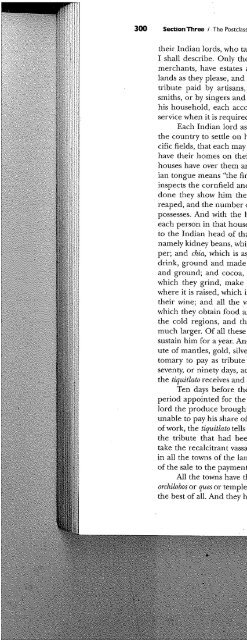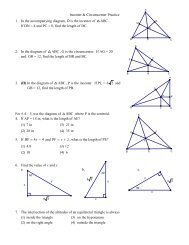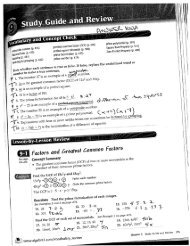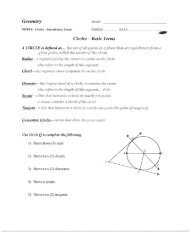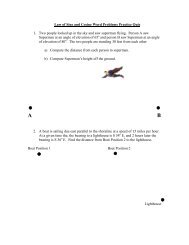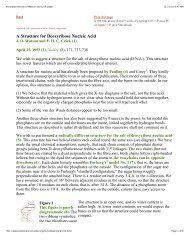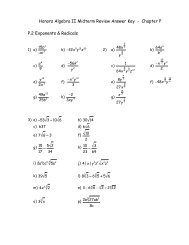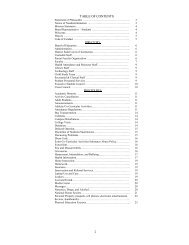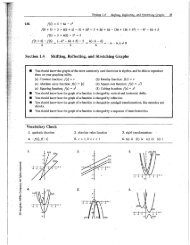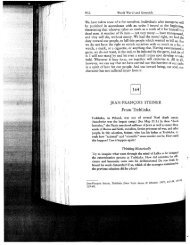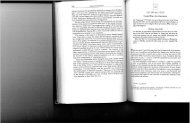tribute under the aztecs and incas - Pascack Valley Regional School ...
tribute under the aztecs and incas - Pascack Valley Regional School ...
tribute under the aztecs and incas - Pascack Valley Regional School ...
You also want an ePaper? Increase the reach of your titles
YUMPU automatically turns print PDFs into web optimized ePapers that Google loves.
300 Section Three / The Postclassical Period, 500-1500 ¢&: Expansions <strong>and</strong> Contacts<strong>the</strong>ir Indian lords, who tax away <strong>the</strong> greater part of <strong>the</strong>ir produce in a manner thatI sha!l describe. Only <strong>the</strong> lords <strong>and</strong> <strong>the</strong>ir relatives, <strong>and</strong> some principal men <strong>and</strong>merchants, have estates <strong>and</strong> l<strong>and</strong>s of <strong>the</strong>ir own; <strong>the</strong>y sell <strong>and</strong> gamble with <strong>the</strong>irl<strong>and</strong>s as <strong>the</strong>y please, <strong>and</strong> <strong>the</strong>y sow <strong>and</strong> harvest <strong>the</strong>m but pay no <strong>tribute</strong>. Nor is any<strong>tribute</strong> paid by artisans, such as masons, carpenters, fea<strong>the</strong>r-workers, or silversmiths,or by singers <strong>and</strong> kettle-drummers (for every Indian lord has musicians inhis household, each according m his station). But such persons render personalservice when it is required, <strong>and</strong> none of <strong>the</strong>m is paid for his labor.Each Indian lord assigns to <strong>the</strong> common folk who come from o<strong>the</strong>r parts of<strong>the</strong> country to settle on his l<strong>and</strong> (<strong>and</strong> to those who are already settled <strong>the</strong>re) specificfields, that each may know <strong>the</strong> l<strong>and</strong> that he is to sow. And <strong>the</strong> majority of <strong>the</strong>mhave <strong>the</strong>ir homes on <strong>the</strong>ir l<strong>and</strong>; <strong>and</strong> between twenty <strong>and</strong> thirty, or forty <strong>and</strong> fittyhouses have over <strong>the</strong>m an Indian head who is called tiq~itlato, which in tt~e Castiliantongue means "<strong>the</strong> finder (or seeker) of <strong>tribute</strong>." At harvest time this tiq~itlato,inspects <strong>the</strong> cornfield <strong>and</strong> observes what each one reaps, <strong>and</strong> when <strong>the</strong> reaping isdone <strong>the</strong>y show hint <strong>the</strong> harvest, <strong>and</strong> he counts <strong>the</strong> ears of corn that each hasreaped, <strong>and</strong> <strong>the</strong> number of wives <strong>and</strong> children that each of <strong>the</strong> vassals in his chargepossesses. And with <strong>the</strong> harvest before him he calculates how many ears of corneach person in that household wil! requite till <strong>the</strong> next harvest, <strong>and</strong> <strong>the</strong>se he givesto <strong>the</strong> Indian head of that house; <strong>and</strong> he does <strong>the</strong> same with <strong>the</strong> o<strong>the</strong>r produce,namely kidney beans, which are a kind of srnall beans, <strong>and</strong> chili, which is <strong>the</strong>ir pepper;<strong>and</strong> chia, which is as fine as mustard seed, <strong>and</strong> which in warm wea<strong>the</strong>r <strong>the</strong>ydrink, ground <strong>and</strong> made into a solution in water <strong>and</strong> used for medicine, roasted<strong>and</strong> ground; <strong>and</strong> cocoa, which is a kind of almond that <strong>the</strong>y use as money, <strong>and</strong>which <strong>the</strong>y grind, make into a solution, <strong>and</strong> drink; <strong>and</strong> cotton, in those placeswhere it is raised, which is in <strong>the</strong> hot l<strong>and</strong>s <strong>and</strong> not <strong>the</strong> cold; <strong>and</strong> pulque, which is<strong>the</strong>ir wine; <strong>and</strong> all <strong>the</strong> various products obtained from <strong>the</strong> maguey plant, ti’omwhich <strong>the</strong>y obtain food <strong>and</strong> drink <strong>and</strong> footwear <strong>and</strong> clothing. This plant grows in<strong>the</strong> cold regions, <strong>and</strong> <strong>the</strong> leaves resemble those of <strong>the</strong> cinnamon tree, but aremuch larger. Of all <strong>the</strong>se <strong>and</strong> o<strong>the</strong>r products <strong>the</strong>y leave <strong>the</strong> vassal only enough tosustain hint for a year. And in addition <strong>the</strong> vassal must earn enough to pay <strong>the</strong> <strong>tribute</strong>of mantles, gold, silver; honey, wax, lime, wood, or whatever products it is customaryto pay as <strong>tribute</strong> in that country. They pay this <strong>tribute</strong> every forty, sixty,seventy, or ninety days, according to <strong>the</strong> terms of <strong>the</strong> agreement. This <strong>tribute</strong> also<strong>the</strong> tiqttitlato receives <strong>and</strong> carr’~es to his Indian lard.Ten days before <strong>the</strong> close 9f <strong>the</strong> sixty or hundred days, or whatever is <strong>the</strong>period appointed for <strong>the</strong> payment of <strong>tribute</strong>, <strong>the</strong>y take to <strong>the</strong> house of <strong>the</strong> Indian!ord <strong>the</strong> produce brought by <strong>the</strong> tiquitlatos; <strong>and</strong> if some poor Indian should proveunable to pay his share of <strong>tribute</strong>, whe<strong>the</strong>r for reasons of health or poverty, or lackof work, <strong>the</strong> tiquitlato tells <strong>the</strong> lord that such-<strong>and</strong>-such will not pay <strong>the</strong> proportion of<strong>the</strong> <strong>tribute</strong> that had been assigned to him; <strong>the</strong>n <strong>the</strong> lord tells <strong>the</strong> tiq~itlato totake <strong>the</strong> recalcitrant vassal to a tia~g~e’z or market, which <strong>the</strong>y hold every five daysin all <strong>the</strong> towns of <strong>the</strong> l<strong>and</strong>, <strong>and</strong> <strong>the</strong>re sell hint into slavery, applying <strong>the</strong> proceedsof <strong>the</strong> sale to <strong>the</strong> payment of his <strong>tribute</strong> ....All <strong>the</strong> towns have <strong>the</strong>ir own l<strong>and</strong>s, long ago assigned for <strong>the</strong> provision of t-heord~ilobos or ques or temples where <strong>the</strong>y kept <strong>the</strong>ir idols; <strong>and</strong> <strong>the</strong>se l<strong>and</strong>s were <strong>and</strong> are<strong>the</strong> best of all. And <strong>the</strong>y have this custom: At seeding time all would go ibrth at <strong>the</strong>


